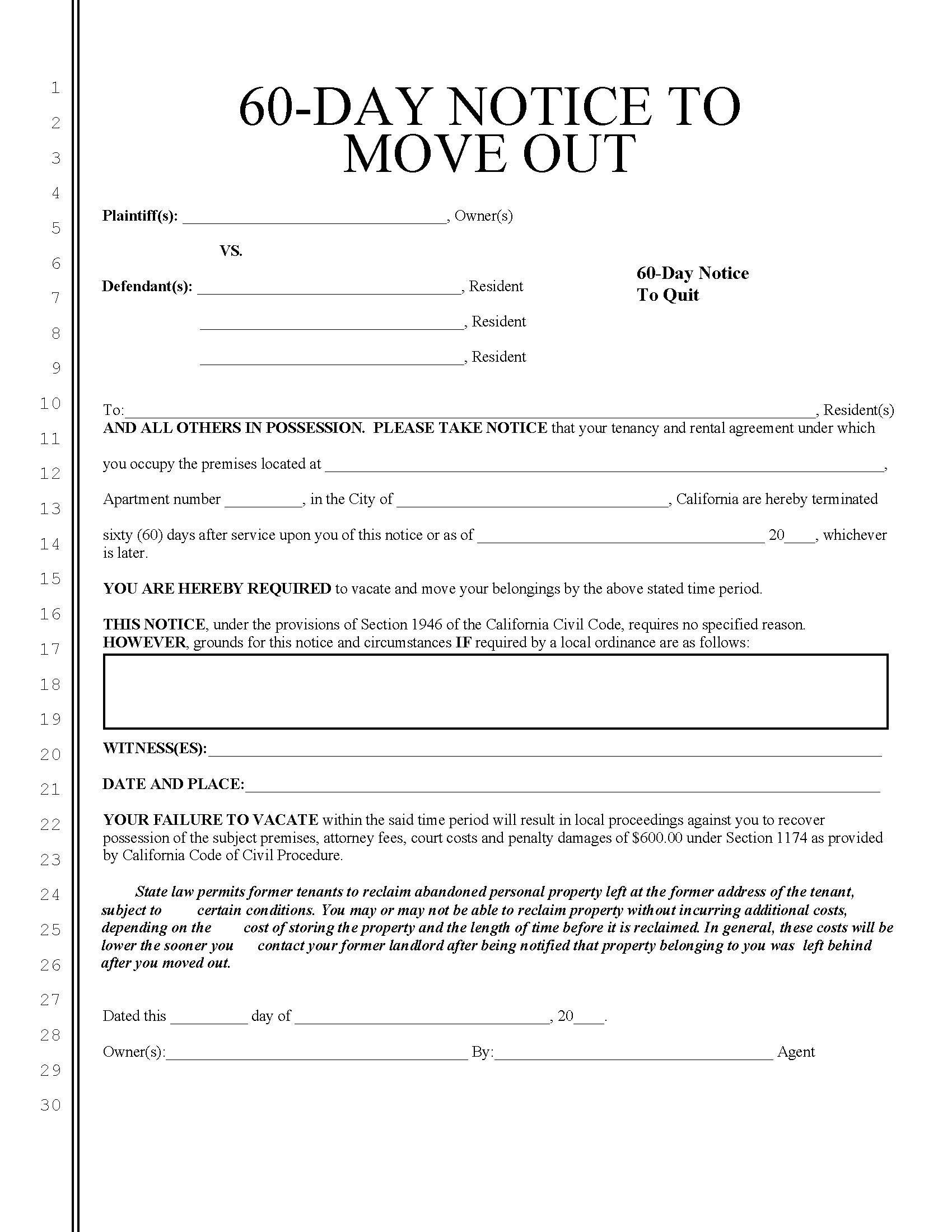Decoding the 60-Day Notice to Vacate

Moving can be a stressful experience, fraught with logistical puzzles and emotional baggage. Whether you're a landlord initiating the process or a tenant on the receiving end, a 60-day notice to vacate plays a pivotal role. This document, often a legal requirement, sets the stage for a transition, providing a timeframe for both parties to prepare. But what exactly does a 60-day notice entail, and how can you ensure a smooth, legally sound process?
The 60-day notice, a cornerstone of tenancy agreements, serves as a formal communication of intent to terminate a lease. This two-month heads-up provides tenants ample time to secure new housing and landlords the opportunity to find new occupants. Navigating this process requires understanding the nuances of local laws, which can vary significantly, affecting everything from required notice periods to acceptable delivery methods.
Historically, formal notice periods evolved alongside property rights and lease agreements. These regulations aimed to balance the interests of property owners and tenants, preventing abrupt evictions and promoting stability. The 60-day timeframe became a common standard, providing a reasonable balance, though shorter or longer periods exist depending on the jurisdiction and specific lease terms.
The importance of a properly executed 60-day notice cannot be overstated. It's the foundation for a legally sound termination of tenancy. For landlords, failure to adhere to proper procedures can lead to delays in regaining possession of the property and potential legal challenges. For tenants, receiving a valid notice offers protection against unlawful eviction, providing the necessary time to plan their move without undue pressure.
One of the primary issues surrounding 60-day notices is ensuring compliance with local laws. Variations in required wording, delivery methods (certified mail, personal delivery, etc.), and specific circumstances (end of lease term vs. termination for cause) can create confusion. Understanding these nuances is critical to avoiding potential legal pitfalls.
A simple 60-day notice to vacate is a written document that informs a tenant their lease is ending and they must vacate the premises within 60 days. A simple example would be a landlord providing a tenant a written notice stating, "This notice serves to inform you that your tenancy at [address] will terminate on [date], 60 days from today. You are required to vacate the premises on or before that date."
Benefits of a properly executed 60-day notice to vacate include: clarity for both parties, legal protection, and sufficient time to prepare. For tenants, it provides time to find new housing, arrange movers, and manage the logistics of relocation. For landlords, it allows ample time to prepare the property for new tenants, minimizing vacancy periods.
Advantages and Disadvantages of a 60-Day Notice
| Advantages | Disadvantages |
|---|---|
| Provides ample time for tenants to find new housing | Can be a long time for landlords if the property is vacant |
| Protects both landlords and tenants legally | Doesn't offer much flexibility if circumstances change unexpectedly |
| Allows landlords time to find new tenants | Can create tension between landlords and tenants |
Best Practices:
1. Consult local laws: Ensure your notice complies with specific state or local regulations.
2. Use clear and concise language: Avoid ambiguity and legal jargon.
3. Document everything: Keep records of the notice delivery and any communication related to the vacate process.
4. Deliver the notice properly: Follow legal requirements for delivery methods (certified mail, personal service).
5. Communicate openly: Maintain clear communication with the tenant throughout the process.
FAQ:
1. What if the tenant doesn't leave after 60 days? Legal eviction proceedings may be necessary.
2. Can a 60-day notice be rescinded? It depends on the specific circumstances and local laws.
3. Can a landlord shorten the notice period? Generally, no, unless the lease agreement allows for it.
4. What if the tenant disputes the notice? Legal counsel may be required to resolve the dispute.
5. What happens to the security deposit? Landlords must follow local laws regarding security deposit returns.
6. Can a tenant break a lease without a 60-day notice? Generally, no, but there may be exceptions in specific situations (e.g., military deployment).
7. Is a verbal 60-day notice sufficient? Generally, no. A written notice is usually required.
8. What if the property is sold during the 60-day period? The new owner typically inherits the existing lease agreement and notice requirements.
Navigating the process of a 60-day notice to vacate requires careful attention to detail and adherence to legal procedures. Understanding the nuances of local laws, crafting a clear and concise notice, and maintaining open communication throughout the process are essential for both landlords and tenants. A well-executed 60-day notice facilitates a smooth transition, minimizing potential conflict and ensuring a legally sound termination of tenancy. By following best practices and seeking professional advice when needed, both parties can navigate this process with confidence and clarity. Remember, a properly handled 60-day notice is more than just a formality; it's a cornerstone of a respectful and legally sound landlord-tenant relationship.
Hauling made easy truck and trailer rental adventures
Transform your walls with suede paint a home depot guide
Unlocking your 403b navigating distribution taxes













